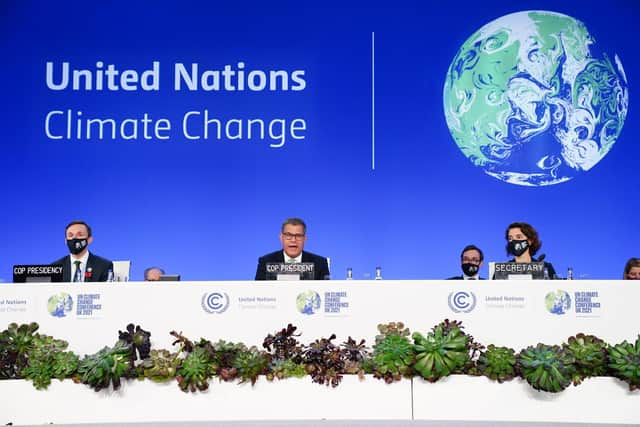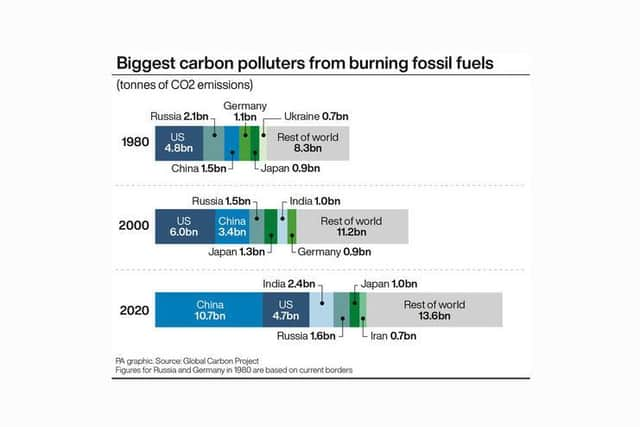What is COP26? What COP26 stands for and what the final agreement says countries must do to halt climate change
and live on Freeview channel 276
After several weeks of deliberation between countries, COP26 finally came to an end last week with an updated climate agreement being formed to help limit the ongoing effects of climate change across the globe.
COP26 began on 31 October and aimed to bring countries together to accelerate action towards the goals of the Paris Agreement.


Advertisement
Hide AdAdvertisement
Hide AdThe Paris Agreement, adopted in 2015, set out a goal to keep the rise in mean global temperature to below 2 °C, as well as increasing funds available to combat the climate crisis.
This is what you need to know about the The Glasgow Climate Pact made at COP26- and what this means for climate change.
What does COP26 stand for?
'COP' stands for ‘Conference of the Parties’.


For nearly three decades the UN has been bringing together almost every country on earth for these 'COP's, with this year being the 26th annual summit since they began.
World leaders arrived in Glasgow for the summit this year alongside tens of thousands of negotiators, government representatives, businesses and citizens for 12 whole days of talks.
Advertisement
Hide AdAdvertisement
Hide AdThe main aim of these talks was to maintain the goal of keeping the global temperature below 2°C.
Why does it matter if the world warms up by 2°C?
An increase of 2°C would lift sea levels by 56 centimetres, causing hundreds of millions of people to be displaced from their homes due to sea levels rising.
Marine heat waves would become 41 times more likely in a world 2°C warmer, threatening coral reefs and the plants and animals that depend on them.
Since coral reefs support fisheries, rising ocean temperatures would also threaten a key source of income and food.
Advertisement
Hide AdAdvertisement
Hide AdSpecies across the animal and plant kingdoms would be wiped out as temperatures rise and their habitats get destroyed- if the planet warms beyond 4.5°C, then the majority of the planet would no longer be able to host wildlife.
On top of this, an increase in global temperature would lead to entire communities being swept away in storms, with category 4 and 5 tropical storms becoming more common on a yearly basis.
What does the final agreement say?
COP26 ended with the formation of the Glasgow Climate Pact- an agreement built upon the foundations laid out by the Paris Agreement of 2015.
Below is a breakdown of the various components of the agreement made last weekend.
Fossil fuels
Advertisement
Hide AdAdvertisement
Hide AdThis was one of the most notable topics of conversation at COP26, as up until now no agreement has ever been made that explicitly refers to fossil fuels.
Despite significant progress being made regarding the inclusion of fossil fuels in COP26's agreement, a last-minute dispute over coal use on Saturday evening almost derailed the entire conference.
Initially it was agreed that countries would “accelerate efforts towards the phase down of unabated coal power” and accelerate the phase-out of “inefficient fossil fuel subsidies”.
However, following a push led by China, and backed up by India, it was decided to change the language from accelerating the “phase out” of unabated coal to “phase down”- a move that prompted angry responses from vulnerable countries.
Advertisement
Hide AdAdvertisement
Hide AdNevertheless the addition of fossil fuels to the agreement is a historic step forward towards halting the climate crisis.
Finances
Despite the 2015 Paris Agreement stating that at least $100 billion per year in climate finance was necessary to halt the climate emergency, many countries have not yet made the steps to reach this target.
The failure of rich countries to meet this was a popular topic of conversation at this month's summit, and on Sunday a new commitment was made by nations to now deliver on their promises every year through to 2025.
There is also a commitment for wealthier nations to help poorer countries become more resilient against weather caused by climate change- as well as offering compensation to those most affected.
Cutting emissions
Advertisement
Hide AdAdvertisement
Hide AdThe pact also challenges countries to return to next year's conference with improved climate targets in line with keeping global warming below 2°C and closer to 1.5 °C.
This means that countries with weak climate plans will now be under more pressure to improve their plans by next year.
The countries that are most affected by this new agenda are China, Australia, the US and Saudi Arabia.
Despite the progress of this agreement, Australia has already suggested it will ignore calls to update its target.
When is the next summit?
Advertisement
Hide AdAdvertisement
Hide AdCOP 27 was originally expected to take place from 8 to 20 November 2021.
Due to the COVID-19 pandemic, COP 26 was rescheduled from November 2020 to November 2021.
As a result, COP 27 will take place from 7 to 18 November 2022, giving countries a year to meet the requirements laid out in the Glasgow Climate Pact.
Support the YEP and become a subscriber today. Enjoy unlimited access to local news and the latest on Leeds United, With a digital subscription, you see fewer ads, enjoy faster load times, and get access to exclusive newsletters and content. Click here to subscribe.
Comment Guidelines
National World encourages reader discussion on our stories. User feedback, insights and back-and-forth exchanges add a rich layer of context to reporting. Please review our Community Guidelines before commenting.
